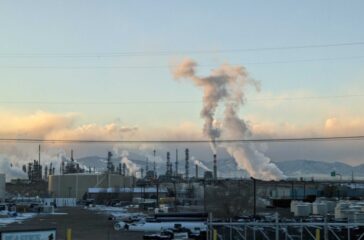Hazardous chemical accidents happening with “alarming frequency”
By Carey Gillam
Hazardous chemical accidents are occurring almost daily, on average, in the United States, exposing people to dangerous toxins through fires, explosions, leaks, spills and other releases, according to a new analysis by nonprofit researchers.
The report, which was prepared by Coming Clean, in conjunction with a network of environmental and economic justice organizations in the Coalition to Prevent Chemical Disasters, documents what it calls an “alarming frequency” of accidents, and comes a month before US regulators are expected to release final rules aimed at preventing such incidents. It comes one day after an explosion and fire at a Texas petroleum processing plant injured at least one plant worker and triggered evacuations and stay-at-home-orders to community residents.
The report is in line with a prior analysis revealed in The New Lede in February, which reported such incidents were happening approximately every two days. The new report shows 829 hazardous chemical incidents from Jan. 1, 2021, through Oct. 15 of this year, or roughly one every 1.2 days. The report includes revised higher numbers for 2021 not included in the February analysis that reflect incidents at a number of Texas facilities amid extreme cold temperatures in February of that year. The research is based on capturing incidents of chemical spills via monitoring news sources; researchers say the figures should be regarded as conservative because not all of them are reported in the news media.
The majority of the incidents tallied are connected to the fossil fuel industry, including the use, transport, production and disposal of fossil fuels and fossil fuel products, according to the report, which is accompanied by a searchable database of chemical incidents.
“Chemical disasters are happening across the entire chemical supply chain, which depends on fossil fuels for feedstock, energy and distribution,” said Maya Nye, federal policy director for Coming Clean. “So not only are the production of these chemicals contributing to chemical disasters, they are contributing to climate change, and endangering worker and community safety throughout their existence.”
There has been increased scrutiny on chemical accidents in the aftermath of a Norfolk Southern train carrying hazardous chemicals derailing in the Ohio village of East Palestine in February. Emergency crews released toxic vinyl chloride from five cars and burned it to keep them from exploding; residents have reported health concerns linked to the incident.
 EWG
EWG
